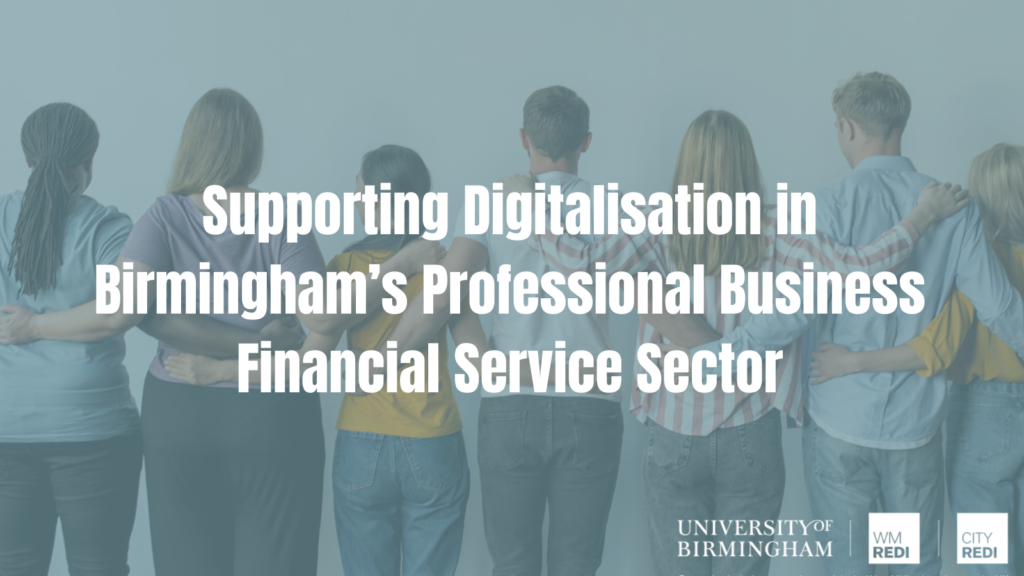
A new report, in collaboration with The Greater Birmingham and Solihull Local Enterprise Partnership, evaluates a pilot programme utilizing the 'No Code' approach to developing apps for businesses in the West Midlands as well as teaching young people digital skills.
The Business Professional Financial Services (BPFS) sector is the largest sector by turnover, employment, and number of businesses in the West Midlands, as well as the fastest growing. The BPFS cluster in Birmingham is the first outside London to have reached critical mass in terms of offering a full range of services, but it has been slower to provide digitalised services.
Digitisation and BPFS sector
The Kalifa Review of UK FinTech identified digitalisation as both a risk and an opportunity for the sector. Much of which is steeped in traditional ways of doing business and potentially at risk from new business models being developed in the ProfTech subsectors including FinTech, PropTech, LawTech and InsurTech. The Greater Birmingham and Solihull Local Enterprise Partnership (GBSLEP) in response to these challenges and opportunities, created SuperTech as a sector body within the region that represents new FinTech entrants and supports existing firms to develop new business models based around digital technologies.
Existing firms who wish to digitalise and new entrants face two specific barriers. The first is the need for skilled individuals who can develop applications and the second is the cost and time required to develop applications to support the introduction of new digital service offerings. The West Midlands was well placed to draw on Community Renewal Fund (CRF) funding to pilot the use of the No_Code approach to developing apps to address these barriers through a successful bid led by GBSLEP.
SuperTech and Millions Lab
The creation of SuperTech and the presence and interest of Millions Lab based in the region provided the basis of a strong collaboration to both support (a) young people develop skills in No_Code approach to developing apps and (b) entrepreneurs and existing businesses in developing and launching new digital services. Other collaboration members included three further education colleges, Birmingham Metropolitan College, Walsall College, and Dudley College, as well as Million Labs, the West Midlands Growth Company, and City-REDI as the independent evaluation partner. Members of SuperTech supported the delivery of the pilot with in-kind support such as the use of facilities, access to experts and advice on value proposition, financing the development and launch of applications, business planning and finance.

The No_Code Approach to developing digital applications
No_Code is a potentially transformative approach to developing digital applications to support new business models by existing businesses and the establishment of new innovative business ventures. It achieves this using programming tools that do not require the user to be an expert in coding to develop software applications. The potential economic benefits to the West Midlands economy are derived from the way No_Code development can transform the way technology-based enterprises and services are started. Its power lies in the ability to build fully functioning apps cheaper, faster and without coding skills, reducing costs and time taken. Using a conventional coding approach to app development can take up to 18 months for a fully functional application and cost upwards of £55,000. Whereas the No-Code approach developed by Million Labs, using the Bubble platform, can reduce the potential development time to weeks and cost as little as £5,000 – thereby, removing significant barriers to start-up creation, business growth and business growth and innovation.

Evaluation of the pilot programme
It would be fair to say the pilot programme was truly ambitious and comprehensively delivered over six months. This did create some challenges for City-REDI as the evaluation team and required the adoption of a Real-World Evaluation approach developed by Michael Bamberger and colleagues. Real World Evaluation approach, initially called Shoestring evaluation until it was realised the name might lack credibility, sets out a series of steps that might be taken to increase the robustness of an evaluation study where the evaluators are working under one or more of the following constraints: limited budget (capped as a small percentage of CRF grant), time (we only had 6 months), data (were not able to measure all intended outcomes) and political constraints (reorganisation of business support in the region). Fortunately, since the pilot was created within WMREDI collaboration agreement it was possible to match funding made available from CRF grant.
Our evaluation was effectively a meta-evaluation that synthesised evaluations of the three strands of the pilot namely:
- No_Code Bootcamps aimed at young people aged 16 to 19 years attending the three partner colleges to develop their digital skills and open new opportunities by learning how to develop an app using No_Code development platforms. Intended outcomes included young people feeling empowered to consider opportunities for self-employment and entrepreneurial pathways, as well as considering working in BPFS and tech sectors. Another important outcome is the development and piloting of a curriculum for teaching app development skills that can be more widely adopted.
- Hackathons are for existing BPFS businesses based in the region who could benefit from identifying opportunities to introduce new innovative products and services, and potential partnerships.
- Ideas2App could be described as an accelerator for potential business founders with viable business ideas/value propositions for a rapid-build app with support from the SuperTech network.
The purpose of this blog is to encourage you to read the evaluation report as it provides useful lessons with regard to:
- Delivering classroom-based training remotely in app development and how to make that training appropriate and relevant to young people leaving a curriculum that can be adopted and adapted by Further Education Colleges as a legacy of the project.
- Creating an effective regional partnership that pulls together different sectors with a common goal; including private sector providers specialising in supporting non-technical founders that are at the idea stage to launch their start-up with a minimum viable product using No_Code approach.
- Providing accelerator-type support for founders with viable business propositions for digital services and products.
- Demonstrating the potential of digital apps to existing businesses so they can develop and introduce new innovative business models, products, and services.
The report made several recommendations at the pilot level:
- The collaboration created to deliver the pilot should continue to receive support given its success in delivering the intended pilot outcomes.
- Colleges (and potentially other training providers) in partnership with local partners should explore how they can fund, continue, and expand the provision of training to young people and digital skills to less advantaged adults who wish to consider career progression and entry into potentially more productive and remunerated roles within the BPFS sector in the region. Colleges use learning from the pilot to adapt and scale provision.
- Continued support for founders to develop their businesses, young people to deploy the skills they developed and college tutors in the integration of No_Code offer within college curriculum. All three are recommended with the proviso of providing data to assess the longer-term impacts of the No_Code pilot.
The report made two significant recommendations with regard to future place-based funding streams:
- Rather than set arbitrary contractual outcome measures around employment and businesses created, the funder should agree on project success criteria that can be used to monitor progress towards achieving these outcomes. This is particularly important for projects that are funded for less than a year when these outcomes often will only start to materialise in the second or third year after beneficiaries enter the project.
- Consider how the contractual side can be streamlined to reduce both unnecessary burdens, support dialogue between the funder and those delivering projects that support learning and better outcomes and reduces delay. Some aspects of this pilot had time-critical pathways which mean extending the project completion date provided little benefit, i.e. provision of training for young people had to be delivered within their College’s academic year.
View the full evaluation report.
This blog was written by George Bramley, Senior Analyst, City-REDI / WMREDI.
Disclaimer:
The views expressed in this analysis post are those of the authors and not necessarily those of City-REDI / WMREDI or the University of Birmingham.
